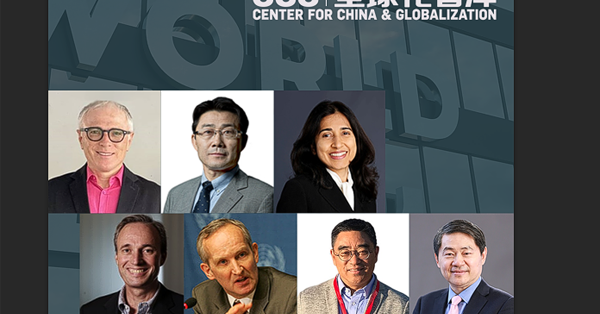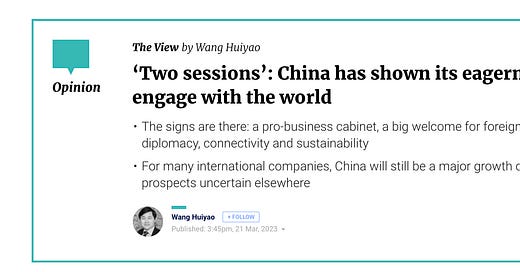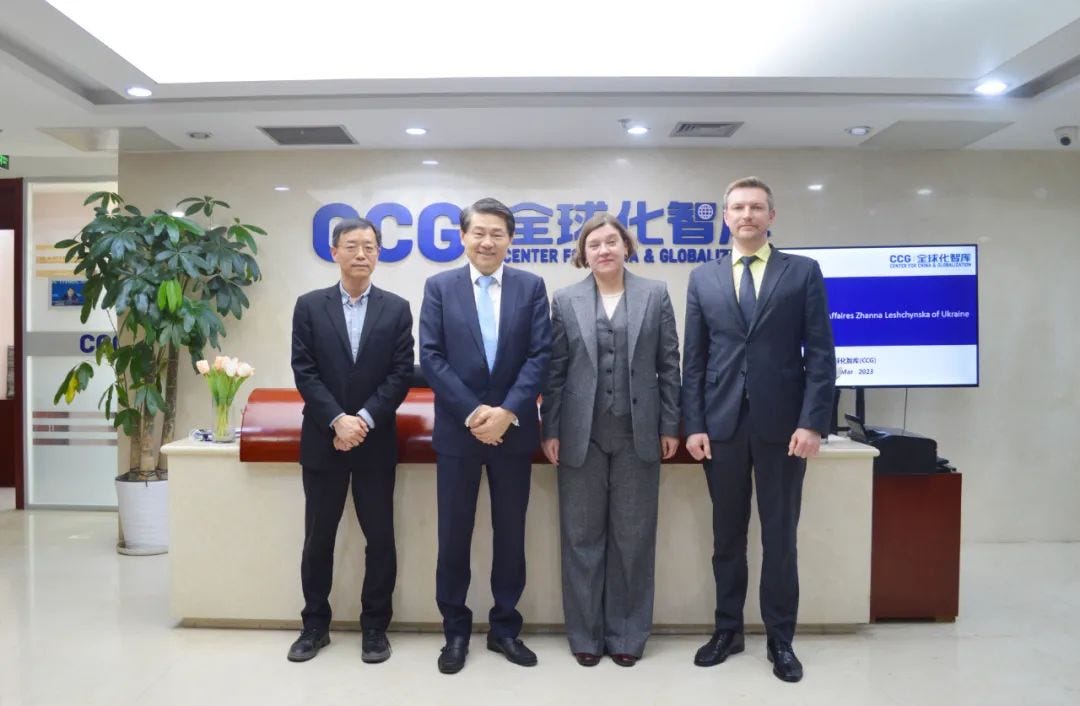Henry Huiyao Wang on the "Two Sessions"
In his column in the South China Morning Post, Wang wrote: "China has shown its eagerness to do business and engage with the world."
Henry Huiyao Wang, founder and President of the Center for China and Globalization (CCG), yesterday shared his thoughts in his South China Morning Post column on the “Two Sessions” just concluded in Beijing.
But before that, one CCG Update newsletter was cited in an Associated Press report yesterday
Gao Fu, then head of the China CDC, also hinted at the need to prepare for an exit. At a mid-April internal panel discussion recently made public by the Beijing-based Center for China and Globalization think tank, Gao was quoted as saying “omicron is not that dangerous,” that there were public discussions on whether zero-COVID needed to be adjusted, and that they “hope to reach a consensus as soon as possible.”
From the AP reporter


Referring to
Also, CCG received the Charge d'Affaires of Ukraine in China on March 15
The View by Wang Huiyao
‘Two sessions’: China has shown its eagerness to do business and engage with the world
The signs are there: a pro-business cabinet, a big welcome for foreign investment and a big push for diplomacy, connectivity and sustainability
For many international companies, China will still be a major growth driver this year – especially with prospects uncertain elsewhere
China’s “two sessions” – the annual meetings of the legislature and political advisory body – which wrapped up last week in Beijing, are always eagerly watched by investors around the world. This year, along with the tailwinds of China’s reopening, the meetings point to promising areas for international engagement and economic cooperation.
First, the newly appointed cabinet is familiar with the market economy and private sector, and well-placed to promote China’s integration with the global economy. In his first press conference as premier, Li Qiang sent positive signals with his pragmatic tone and pledged that China will continue to open up “no matter how the external situation may evolve”.
Li is seen as having pro-business credentials, having worked in the dynamic coastal regions of Zhejiang, Jiangsu and Shanghai, where he played a key role in supporting Tesla’s setting up of its Gigafactory, the first wholly foreign-owned car manufacturing plant in China.
Also, the retention of trusted technocrats in key roles – including the heads of the central bank and ministries of finance and commerce – provides reassurance of policy continuity, as new appointees settle in and the restructuring of the government and party organs is carried out.
These officials have been among China’s most important interlocutors at international meetings such as of the Group of 20, better known as G20, and have overseen reforms in the country’s financial and banking sectors, which are among the most important areas of China’s market liberalisation in recent years.
On the policy side, the government work report and other key documents presented at the two sessions also gave foreign investors some positive signs.
Fortifying the Chinese economy against risk and external uncertainty was a major theme of the meetings. But this drive for national security is not all bad news for multinational companies. The Chinese government still sees foreign investment as crucial to achieving its long-term strategic goals, particularly projects that can help secure its industrial chains and boost its innovation.
The government work report contained language that upgraded the importance of attracting foreign investment this year. There were also pledges to open markets wider, especially in services, and to improve the business environment, with an emphasis on legal and regulatory reforms to promote fair competition and better protect foreign investment.
Steps to ease cross-border travel are also a boost for international business. Just after the two sessions closed, China announced that it would resume issuing nearly all categories of visas for foreign visitors. Global business executives have started to return to China, and many more plan to visit for key events this month such as the China Development Forum and Boao Forum for Asia.
A commerce ministry spokesman reiterated at a recent press conference that investors from all over the world were welcome in China, and that the ministry will “play an active role in promoting key foreign-funded projects”, including “more convenient services for executives”.
The two sessions also signalled that China would seek to increase engagement and cooperation abroad this year.
Foreign Minister Qin Gang told the press Beijing had hit the “acceleration button” for diplomacy as China opens and re-engages with the world. This diplomatic engagement will support more economic cooperation and create opportunities for foreign firms in a range of sectors and regions.
The double-digit budget increase of 12.2 per cent for diplomacy, announced at the two sessions, reflects China’s ambitions to play a bigger role around the world, especially in the Global South, under its global initiatives for development and security.
China’s recent role in brokering a restoration of Iran-Saudi ties is a sign of things to come as the country increasingly translates its economic influence into political clout in regions such as the Middle East.
Meanwhile, the Belt and Road Initiative, now in its 10th year, is being recalibrated. The National Development and Reform Commission’s call to build “small but beautiful” projects along the belt and road indicates a shift towards a greater focus on quality, efficiency and risk control, and towards projects in sustainability, digital technology and health.
This should expand opportunities for cooperation in third markets with multinational corporations that have solutions and expertise in these areas, particularly with an uptick in activity expected with the third Belt and Road Forum due to be held later this year.
Finally, sustainability continues to stand out as a promising area for long-term cooperation. The government work report confirmed that green development will remain a priority this year.
Multinational companies will be well-placed to establish themselves as leaders in this field by customising their global green strategies to the China market, and linking global commitments to the government’s environmental goals through pilot projects and local partnerships related to areas such as supply chains, technological upgrading and green consumption.
Although geopolitical frictions have increased risks for multinational companies, the two sessions reinforce the view that China will continue to present lucrative opportunities to foreign investors that can adapt and find niches aligned with the nation’s long-term development strategy. For many international companies, China will continue to be a major driver of growth this year – especially when prospects are uncertain elsewhere.
Wang Huiyao is the founder of the Centre for China and Globalisation, a Beijing-based non-governmental think tank
Recent CCG activities
Recent content in The East is Read and Pekingnology








